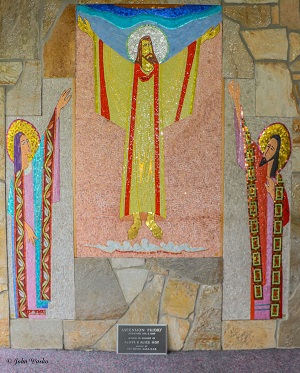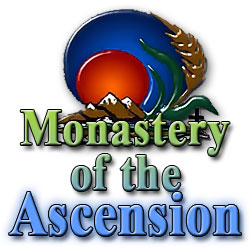Community
John O'Hagan
Introduction
Oblates, on making oblation, do not become members of an order but of a particular community. The profession ceremony contains the question: " Do you wish to make your Final Oblation as an Oblate of Saint Benedict and thus be affiliated with the Benedictine community of . . . "and the oblation which is signed reads in part "I . . . offer myself to Almighty God through the Blessed Virgin Mary and our Holy Father Benedict as an oblate of (this community)."Having joined this community what are our duties to it? One community offers the following guidelines. Oblates
keep in touch with their community through the Director of Oblates, they let others know about their monastic community, support its apostolic work and encourage young men and women in their vocations to the monastic life. They visit the monastery occasionally, become familiar with the monastic life, and assist at the community liturgy and community prayer when this is possible. They tell others about the Oblates of St. Benedict and encourage them to become Oblates if they seem to be in search of such a special way of life in the world.1
If we examine this statement we can find eight separate charges here:
1. Keep in touch with the community 2. Let others know about the community 3. Support the work of the community 4. Encourage vocations to the monastic life 5. Visit the monastery 6. Become familiar with monastic life 7. Assist at community liturgy 8. Spread the word of Oblation as an option for other Christians
We will discuss specifics of these obligations below. First, however, arises the question of what is our community? The answer to this writ large is the same as Jesus' answer to the man who wanted to know who was his neighbor. However for purposes of giving direction to the new Oblate the following is offered.
We have two communities to serve. The first, at least for purposes of this article, is one which I shall call our "Benedictine Community."Our Benedictine Community is all of the men and woman who are members of the Monastery of the Ascension, whether they be priests, religious brothers, candidates, or lay oblates. We must get away from the view most of us have grown up with that the community is only those men who live at the monastery. They are in fact a unique, cenobitic community, within the larger Benedictine community I am describing. That is no different really than the dual roles played by oblates who are a unique community of lay oblates within a larger "world community." This "world community"is the second community I will discuss, the world of family, business and professions most of us live and move in for most of our lives. We have obligations to both of these communities.
Our Obligations To Our Benedictine Community
Keep in touch with the community
Consider as members of your family this new extended family you have been adopted into. As in any family there are some members who have more affinity for each other, and we have a duty to seek these relationships, to foster and to nourish them. As the gospels stress, all of us have unique talents, and we need to use those talents to help the members of our community. A once yearly retreat, at which we renew acquaintances, would probably be the minimum we could do to fulfill this obligation. Birthdays, feast days or special occasions for those with whom we feel particularly close should be remembered and acknowledged. Members in distress should be able to count on our help whether it be spiritual, physical, emotional or financial. "Go to help the troubled and console the sorrowing."2
Let others know about the community
This pertains primarily to our duties to our larger community, and so will be discussed later. However, it does have application in our Benedictine Community to the extent that we should keep each other informed of developments within the community. Who is ill? Who is getting married? Who has a new child? Who has a particular issue to deal with, for which the community may be able to offer some help?
Support the work of the community
Aside from retreats and spiritual activity at the monastery we need to consider what we can do to support what the community does. This could be financial support, it could be volunteer work, or it could be simply speaking to the uninformed about Benedictine work and spirituality. Particular Oblates are involved in charitable work in their own lay communities. Fellow Oblates can support them in their good works. The priest members of our community give much to our diocese, often at great personal inconvenience. Perhaps some social invitations when they are in our particular parish, or assistance with travel would be in order.
Encourage vocations to the monastic life
Again, this duty is manifest in our "worldly"communities. It does however also have a role within our Benedictine Community. New religious members of the community, particularly younger ones should be welcomed and encouraged by those of us who will most benefit by their perseverance in a demanding lifestyle and particularly by those of us who have experience in sending children off into the world.Our new religious have chosen a life apart, but they have not chosen a life of solitude and certainly not one of loneliness.
Visit the monastery
As mentioned above, a yearly retreat can be considered the minimum for those to whom distance does not present obstacles. Quick "social"calls, should the occasion arise, would not be viewed with disfavor. Those of us seeking a personal confessor or spiritual director have every likelihood of finding one at our monastery. To the extent that you can, attend meetings local meetings of the Oblates in your area.
Become familiar with monastic life
Final oblation is just an introduction to a tremendously rich lifestyle and history. Benedictines have had a huge impact on not just our church, but also our world. Do not be afraid to ask questions as to the whys and wherefores of Benedictine life. Our own Monastery of the Ascension has in residence historians, liturgists and writers of some renown. Delve into the significance of all of the letters and symbols on the very "busy"Medal of St. Benedict. Read Benedictine history, study past writings by Benedictines, and examine current issues from the Benedictine perspective. There is a huge body of work by and about Benedictines. Like everything else these days, much of it is available on the Internet and a good beginning site is www.osb.org.
Assist at community liturgy
Partake in our community liturgy. Join in the responses, chants and songs. Come to the liturgy with proper disposition and take from the liturgy a message which continues after liturgy ends.
Spread the word of Oblation as an option for other Christians
New oblates often could benefit from a few words of, if not wisdom, at least experience from those who have been in the program for a while. Oblation is many things to many people, and particularly positive experiences we may have had in our roles as Oblates should be shared with others. Even Oblates of long standing are often times searching for some meaningful community or social service that would enable them to bring their Benedictine spirituality to the world. Don't hide your candle under a bushel basket when you find a worthwhile venture that your brothers and sisters might share.
Our Obligations To Our World Community
Obviously many of the duties discussed above regarding our Benedictine Community have little application in the world at large, but many could easily be transferred to the daily life of Oblates: "Let others know about the community, encourage vocations to the monastic life, assist at community liturgy and in particular, spread the word of Oblation as an option for other Christians."The key to these activities, and to all our activities in the world as Oblates, is to conduct them while "preferring nothing to Christ."As Norvene Vest puts it:
The whole orientation of the Rule is to the principle that God is everywhere, all the time, and thus that every element of our ordinary day is potentially holy. Very few of us believe that and/or act on it. Benedict urges us both so to believe and so to act. It is an enormous challenge, involving life-long response, and yet it is very simple and can be begun this moment. Because the Rule is so 'homely', so oriented to the opportunities of daily life as grist for the mill of Christian consecration, it has a great deal to say which is directly helpful to a Christian lay person, struggling to live the Christian life, even in our contemporary secular world.3
This is an enormous challenge because we live in not only a secular world, but a world which is, despite rhetoric to the contrary, largely post-Christian or even anti-Christian. An appropriate role for Oblates in the community beyond our Benedictine community is to show our faith to the world around us, and if challenged, to demonstrate that faith as not just valid, but essential.
One mandate that is particularly applicable to our "world community"is to spread the word of Oblation as an option for other Christians. We live in a society that is at best nominally Christian. However, many of those Christians are in this state because they have never been exposed to a belief system and certainly not a lifestyle that "prefers Christ in all things." We as Oblates have, hopefully at least, begun to learn that the Rule of Benedict is a beneficial and reasonable rule of order. We need to communicate that message to others so that they may have access to it. So that they too "May have life, and have it more fully."


